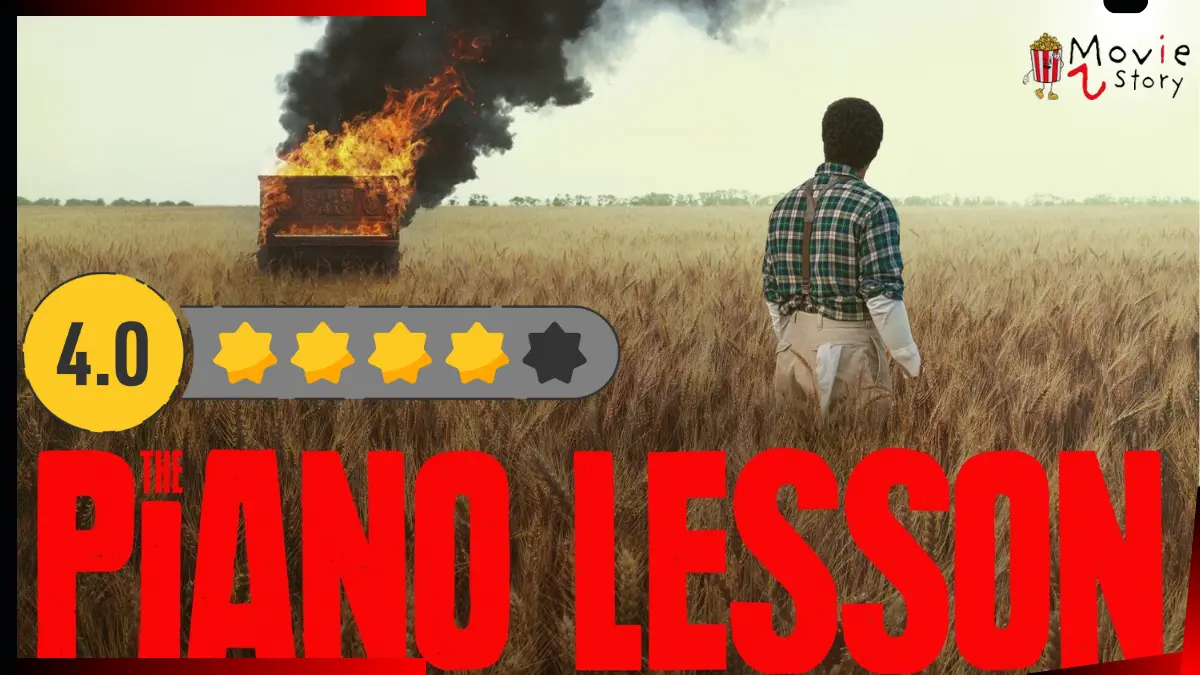The Piano Lesson Movie Review: Malcolm Washington’s feature debut, The Piano Lesson, aims to bring August Wilson’s iconic 1987 play into the cinematic landscape. With his brother, John David Washington, in a central role, and co-starring the ever-potent Samuel L. Jackson and Danielle Deadwyler, this adaptation is a family endeavor. Driven by Denzel Washington’s commitment to preserving Wilson’s work on film, The Piano Lesson presents itself as a labor of love and an exploration of Black American history, lineage, and trauma. However, despite its powerful themes and stunning performances, the film struggles to reconcile its stage roots with the demands of cinema, resulting in an experience that is as stirring as it is uneven.
The Piano Lesson Movie Review
Denzel Washington, deeply invested in honoring August Wilson’s contributions to American drama, has spearheaded the adaptation of Wilson’s Pittsburgh Cycle plays for the screen. Following Fences (2016) and Ma Rainey’s Black Bottom (2020), The Piano Lesson becomes the third adaptation in the series, and the first under the direction of Denzel’s son, Malcolm. As a family project, the dedication is palpable. With Katia Washington as a co-producer and the film being a tribute to Pauletta Washington, the Washington family’s commitment shines. This close-knit collaboration allows for a seamless connection to the story’s themes of familial ties and generational trauma.
Set in 1936 during the Great Depression, the film centers around Boy Willie (John David Washington) and his sister Berniece (Danielle Deadwyler), members of the Charles family who possess a piano carved with images of their enslaved ancestors. Boy Willie arrives in Pittsburgh from Mississippi with his friend Lymon (Ray Fisher), intending to sell the piano and purchase land. His sister, however, sees the piano as a sacred family artifact and vehemently opposes the sale. This conflict becomes the emotional core of the film, as both siblings confront their relationships with the past and its implications for their future.
Uncle Doaker (Samuel L. Jackson) and other supporting characters enhance this dynamic, adding layers to the Charles family’s history and the haunting presence of their ancestral trauma.The cast’s performances are instrumental in bringing The Piano Lesson’s themes to life. John David Washington delivers an electrifying performance as Boy Willie, full of ambition, swagger, and emotional wounds. His presence is so intense that, at times, it can feel overwhelming, yet it aptly embodies Boy Willie’s determination to reclaim his own narrative.
In contrast, Deadwyler as Berniece conveys her character’s restraint and resolve with quiet intensity. She portrays Berniece as deeply rooted in her family’s legacy, yet haunted by it, making her performance both powerful and evocative. Samuel L. Jackson, who reprises his Tony-nominated role as Doaker, lends wisdom and humor to the family dynamic, and Ray Fisher shines as Lymon, providing a counterbalance to Boy Willie’s intensity with his more subdued charm.
The Piano Lesson Official Trailer, Netflix.
Malcolm Washington’s direction in The Piano Lesson is ambitious, blending elements of stage and screen to capture the emotional gravity of Wilson’s text. However, this approach at times disrupts the film’s tonal coherence. To escape the limitations of the play’s theatrical origins, Washington introduces visual storytelling techniques like flashbacks and atmospheric supernatural elements. The film opens with a visually striking Fourth of July scene in 1911 Mississippi, where the Charles family’s ancestors steal the piano from a plantation. This scene, though captivating, sets a different tone than Wilson’s stage production, which emphasized character-driven interactions and dialogue.
The film’s supernatural aspect, depicted through the ghostly presence of the Sutter family’s slave-owning descendant, is another creative choice that elicits mixed responses. While this ghost serves as a metaphor for generational trauma and unresolved history, the literal manifestation risks feeling overly explicit, particularly given Wilson’s nuanced dialogue. As one review notes, the supernatural elements might have been more effective left implied, as the suggestion of haunting, rather than its depiction, could have underscored the film’s message without interrupting the natural flow of the characters’ interactions.
While The Piano Lesson excels in its exploration of the burdens of history, some structural choices detract from its impact. The flashbacks and horror elements, though intriguing, sometimes feel like distractions from Wilson’s lyrical dialogue and the film’s emotional weight. As one review suggests, the moments where the film leans back into quiet, introspective scenes—like Berniece’s measured resolve or the family’s spontaneous work songs—are when it feels most connected to its roots. The inclusion of a gothic, haunted-house atmosphere clashes with these quieter moments, and though the ghost can be read as a metaphor, its literal portrayal may take away from the more profound, internal hauntings each character experiences.
Nevertheless, Washington’s respect for Wilson’s artistry is evident. The film’s emotional highs capture Wilson’s intention to make audiences grapple with complex histories. A scene where the men sing a work song together is a prime example of Wilson’s exploration of resilience and community amidst hardship. These powerful moments punctuate the film with raw authenticity, connecting audiences to the characters’ struggles and their enduring spirit.
Conclusion
The Piano Lesson ultimately stands as an earnest, if imperfect, homage to August Wilson’s work. While Malcolm Washington’s adaptation may falter in its attempt to fully reconcile stage and screen, the film remains a noteworthy contribution to the ongoing effort to preserve and celebrate Wilson’s legacy. The Washington family’s dedication, coupled with the impressive performances of John David Washington, Danielle Deadwyler, Samuel L. Jackson, and Ray Fisher, gives this adaptation a beating heart that resonates despite its flaws.
In the end, The Piano Lesson is a film that wrestles with the same questions that plague its characters: How do we honor the past without being imprisoned by it? How can trauma be transformed into empowerment? Malcolm Washington’s adaptation may not provide all the answers, but in asking these questions, it becomes an essential part of the dialogue surrounding Wilson’s work and Black American history. The Washingtons may not have fully cracked the code on translating Wilson’s plays for the screen, but they’ve laid a meaningful foundation for further exploration, proving once again that the work of honoring and grappling with history is never truly done.
Top 5 Rotten Tomatoes Reviews
It’s another beautifully acted piece of work — though with a startling, even slightly baffling element of the supernatural, a melodramatic séance of strangeness that might have worked better on stage – Peter Bradshaw, Guardian.
John David Washington burrows into Boy Willie’s burn-it-all down rage, but even better is Ms. Deadwyler, who gives a fulsome, heart-rending performance as his sister – Kyle Smith, Wall Street Journal.
There are moments of humor and tenderness, as well as rage and supernatural terror. Malcolm Washington manages to make this cinematic rather than a stage experience, zeroing in on each character, including the piano. Linda and Al Lerner, Movies and Shakers.
A worthwhile, captivating and moving watch full of charismatic performers. Talent isn’t always genetic, but the Washington family is putting in the work to prove otherwise – Lindsey Bahr, Associated Press.
The Piano Lesson strikes a perfect balance, showing us that the past isn’t just about trauma but is laced with moments of jubilance. It’s cathartic and moving — a reminder that strength and survival go hand in hand – Zandra Odetunde, Time Out.
Top Movie Ratings
| Imdb | 6.8/10 |
| Rotten Tomatoes | 91% |
| Metacritic | 69% |
Latest Release Movie:

